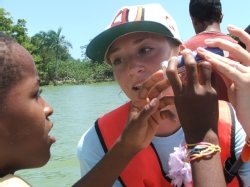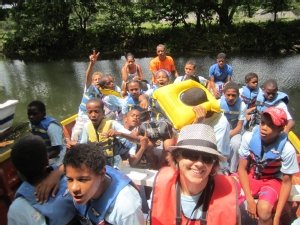Syracuse University student spreads seeds of knowledge to the Dominican Republic
Alaina Mallette presented her work during 2011 Geological Society of America annual meeting

It's an honor for undergraduate students to present posters during the annual meetings of the Geological Society of America (GSA)--a mecca for geologists and Earth scientists. Even more so when the student is not an Earth sciences major, as was the case for Alaina Mallette, a junior geography and Spanish major in Syracuse University's College of Arts and Sciences. She was invited to the 2011 GSA annual meeting in Minneapolis, Oct. 9-12, to present a poster about the work she did last summer in the Dominican Republic.
Mallette's presentation was part of a symposium about bringing science education to underdeveloped countries and populations. She presented the results of a water quality educational program she helped design for students in the Dominican Republic. Her road to the GSA annual meeting began last spring when she enrolled in “World Waters,” a course taught by Earth Sciences Professor Donald Siegel through the Renée Crown University Honors Program.
Siegel’s course, developed as a project for his Laura J. and L. Douglas Meredith Teaching Professorship, explores water in all its forms and permutations of use on a global scale. Topics include the origin of water and its fundamental physical and chemical properties, how water moves globally and locally in the hydrologic cycle, and how humans and ecosystems use water. In addition, the course delves into aspects of water law, policy, and disputes past, present, and into the probable future.
“The course was fascinating,” Mallette says. “It inspired me to combine the work I was doing as a volunteer for the DREAM Project with an idea that was brewing for my Honors Capstone project.”
The DREAM Project (Dominican Republic Education and Mentoring Project) is a U.S.-based nonprofit organization whose mission is to run inclusive, sustainable education programs for children and youth in the Dominican Republic that can be replicated throughout impoverished global communities. Mallette learned about DREAM during her freshman year at SU when a DREAM recruiter came to campus. She first volunteered for one of the organization’s summer camps at the end of her freshman year. The camps provide educational enrichment opportunities for at-risk youth.
The World Water course got Mallette thinking about ways in which she could increase awareness about water quality among the youth who attend DREAM’s summer camps. She brought her idea to Siegel. Together, they developed a four-week pilot science module for DREAM on the fundamentals of water potability. Last summer, Mallette returned to the Dominican Republic and co-taught a class on water quality with Sarah Riggen, a teacher at Woodrow Wilson High School in Washington, D.C.; and Rachel Ottaviano, a teacher at Prospect Hill Academy Charter School in Boston. Both are DREAM volunteers.

“The field tests showed some high levels of nitrates, but overall the water quality was not terrible,” Mallette says. “However, it did not meet U.S. drinking standards because of the nitrate levels.”
Mallette will incorporate the work she did last summer in the Dominican Republic and the additional water-sample analyses being conducted at SU into her Capstone Project, currently titled “Teaching Water Quality to Youth in a 4-week Summer Camp Program in the Northern Dominican Republic.”
Siegel and Jacob (Jake) Bendix, associate professor of geography, are Mallette’s co-advisors for her Capstone Project. “I love working with these engaged and smart students,” Siegel says of Mallette’s initiative. “By providing the initial spark for Jake and me to work together, Alaina might very well have opened a door that will lead to other collegial initiatives and collaborations for future students.”
Siegel notes that another student from his spring World Water class recently approached him to work on a different water issue for her Capstone Project. “I hope to use Meredith and other discretionary funding to support more of these kinds of independent water research projects from my Honors class,” he says.
In addition to her summer volunteer work for DREAM, Mallette now travels to other college campuses to recruit DREAM volunteers. She also founded the DREAM Team at SU, a recognized student organization that recruits DREAM volunteers and conducts fund-raising activities for the organization.
Media Contact
Judy Holmes
